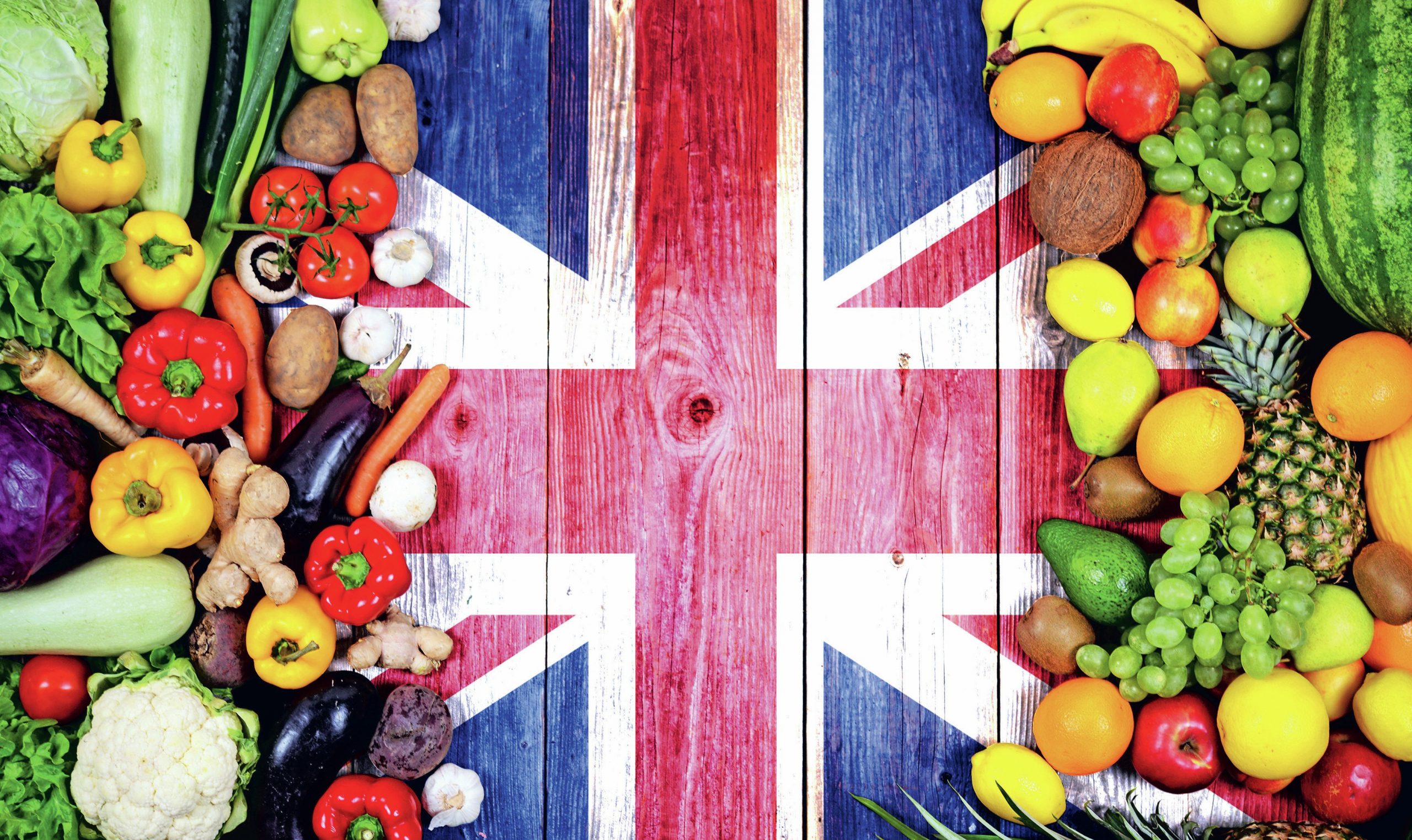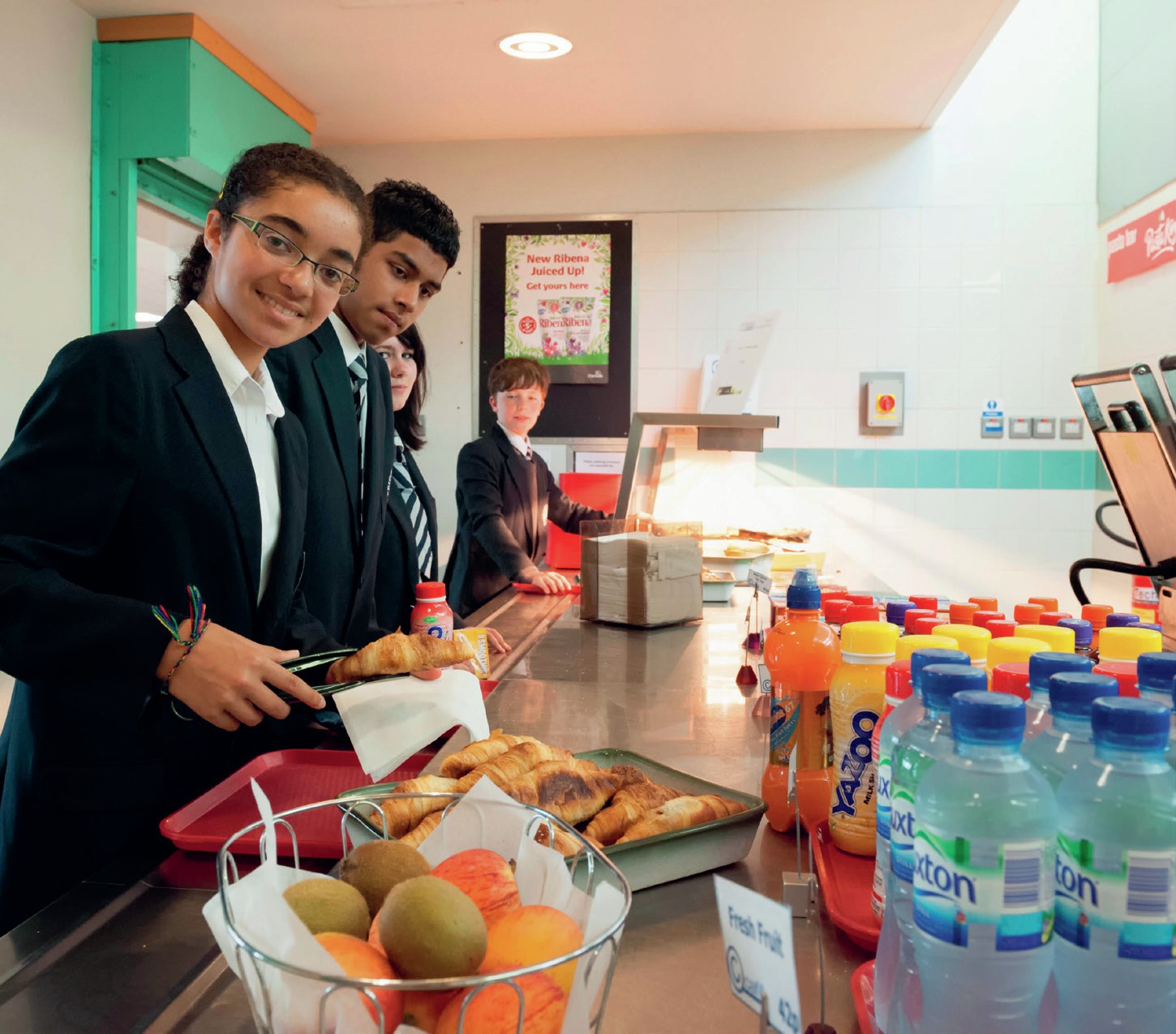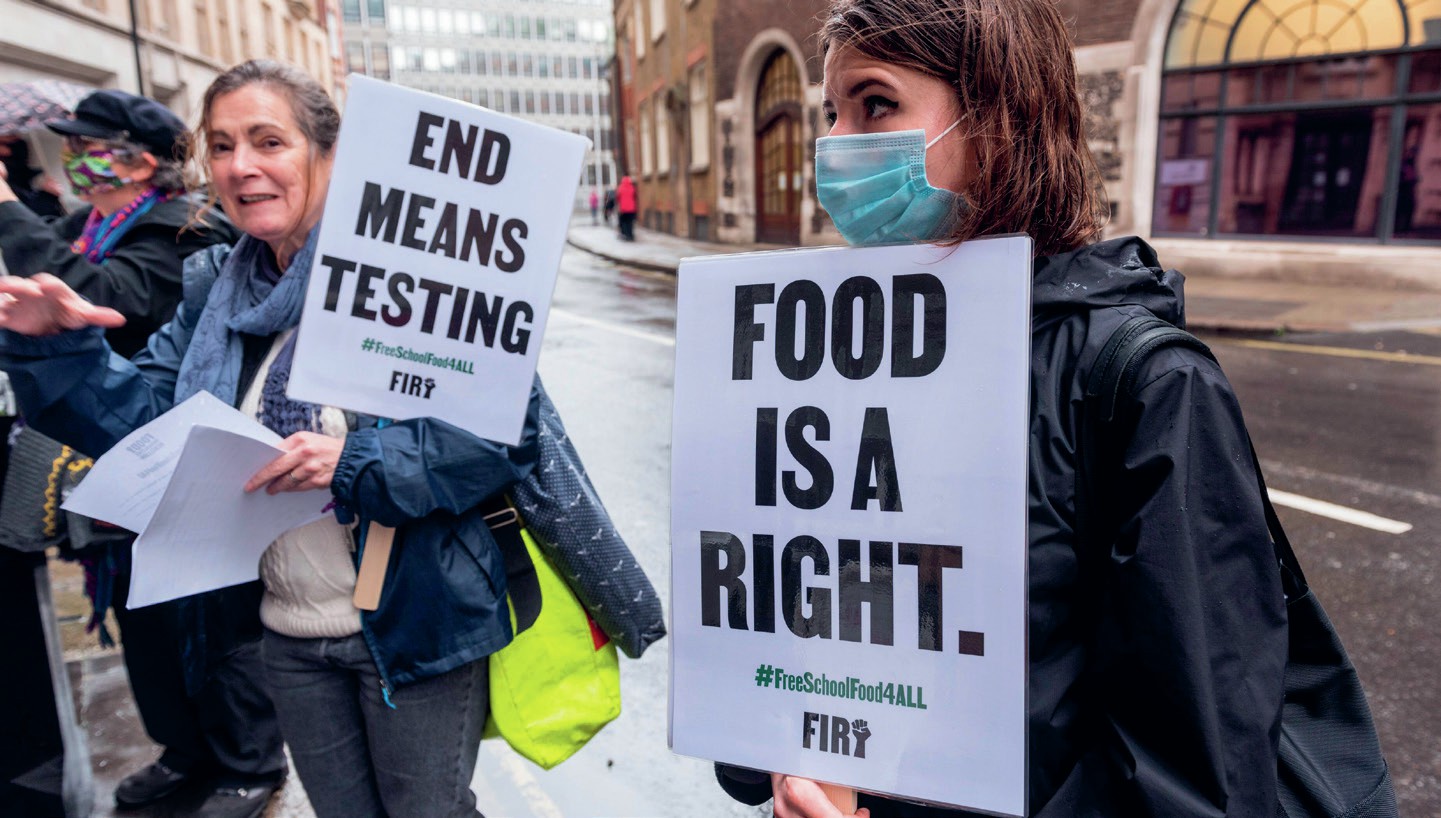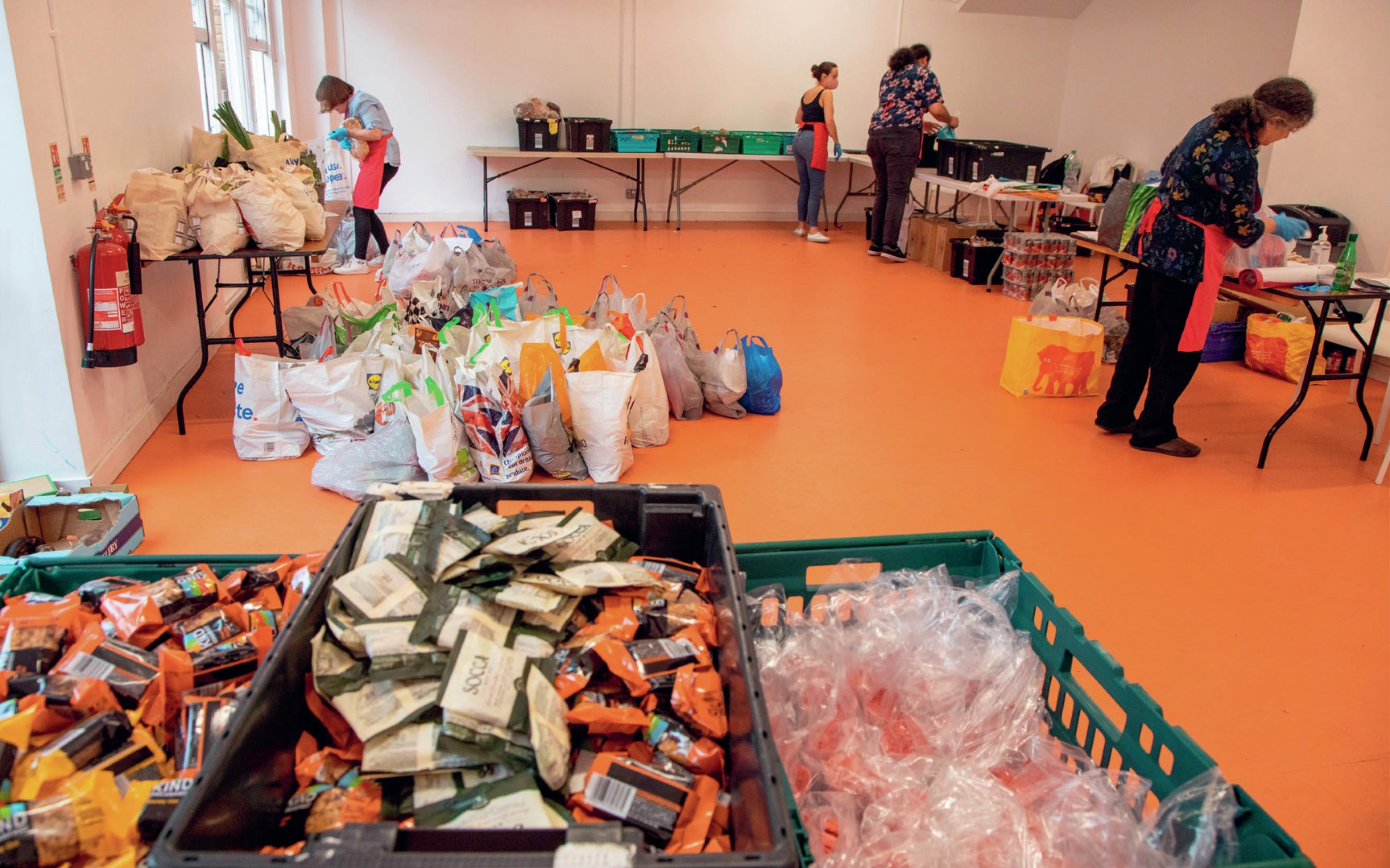Children and food poverty in breadline Britain
Evidence suggests that food poverty is rising in the UK. Why is this happening in a relatively rich country, and what can be done about it?

EXAM LINKS
■ Poverty
■ Social inequality
■ Families and households
■ Social policy
Very large numbers of children and young people in the UK live in lowincome families, with evidence that more have fallen into poverty since the start of the Covid-19 pandemic. Before the crisis, according to official statistics from 2018–19, 4.2 million young people under 18 years were living in relative poverty (in households with an income below 60% of the median) and it has been estimated that a further 200,000 children have moved into relative poverty as a result of the pandemic (Parkes and McNeil 2020).
In this context, household food insecurity and demand for food aid have soared. Research by the Food Foundation in September 2020 found that in about 14% of UK households, children and parents were unable to eat properly in the last 6 months because they could not afford or access food. Between February and October 2020, data from the Independent Food Aid Network (IFAN) show that 134 independent food banks distributed a total of 426,958 emergency food parcels, compared to 226,605 in the same period in 2019 — arise of 88%.
These data represent a fraction of the food bank total. At least 961 independent food banks operate across the UK. The UK’s largest food aid provider, the Trussell Trust, saw a 47% increase in the number of emergency food parcels across the UK between 1 April to 30 September 2020, compared to the same period in 2019.
In our study Families and Food in Hard Times (O’Connell and Brannen 2021) we sought to understand the food practices of parents and children at risk of food poverty in the aftermath of the last major, global crisis. The research was carried out in three European countries — the UK, Portugal and Norway — following the 2008 global financial crisis and so-called austerity measures imposed in two of the three countries. As our research testifies, those worst affected in such crises are families and children who have the least resources.
Food and identity
As sociologists, we understand food and eating to be fundamental not only to physical survival but to personal identity and participation in social life. In conceptualising food poverty, we draw on Peter Townsend’s definition of ‘relative poverty’, as including both material deprivation and exclusion from customary practices.
We also draw on Erving Goffman’s theories of shame and stigma, that get to the heart of the experience of being poor. As family and childhood researchers, inspired by the seminal work of feminist sociologists from the 1980s onwards, we conceptualise households as ‘resource units’, and, in accordance with the ‘new social studies of childhood’, we understand children as social agents in their own right.
Funded by the European Research Council from 2014–19, our research set out to address gaps in what was known about the extent and experience of food poverty in Europe and the difference social context makes. (See Box 1.) In accordance with our conceptual framework, and in contrast to some international comparative research that treats households as undifferentiated units, we were interested in what happens within households and families, the range of resources that families draw on to ‘get by’ and in the experiences of children and young people, as well as adults.
Box 1 Methodology
At the heart of our research were the (micro-level) practices and experiences of children and parents — 45 families in the UK and Portugal and 43 families in Norway. But our multi-layered methodology aimed to set these within their local (meso-level) and national (macrolevel) contexts. To do this, secondary analysis was carried out of large-scale national and international datasets, and researchers in each country drew on published data and research to write reports on the historical, economic, political and policy contexts.
At the level of localities, researchers carried out observations in the two contrasting urban and non-urban areas selected for study in each country. These were supplemented by deskbased research and informal interviews, for example with school staff who assisted with recruitment. At the micro level, we carried out semi-structured interviews, observations and visual methods with both children and parents.
To complement the interview material, a subsample of households (10 in each country) participated in additional visits involving photo-elicitation interviews, a method in which participants took photographs of their everyday lives and discussed them with researchers at a later visit (O’Connell 2014).
Key findings
Because one of our objectives was to inform the work of organisations concerned with poverty and its effects on children and families, in the UK we collaborated with the charity Child Poverty Action Group to publish an Open Access book about children’s experiences (O’Connell et al. 2019). We launched the book at the House of Commons and spoke about the research on the television news and radio.
Food and eating are fundamental not only to physical survival but to personal identity and participation in social life

Salaries and benefits
In around half of the UK families we interviewed, at least one parent was in paid work, despite the mantra that ‘work pays’. In almost all the rest, families were reliant on benefits, but in four cases the families had irregular migration status and so ‘no recourse to public funds’, with no formal income at all. For many families, poverty had been directly caused by, or had led to, other challenges, such as major life events, lack of social support, illness and disability, including mental health issues. These challenges, plus very low incomes and in some cases inadequate housing and cooking facilities, meant that some parents struggled to adequately feed their children.
In most families, compromises were made in terms of the quality of the food purchased and few were able to buy as much fresh fruit or vegetables as they would like. In around half the families, parents regularly skipped meals, while about a quarter of the children did not have enough to eat. If parents were not sacrificing their own intake to protect their children, the number would have been much greater.
While there has been a huge increase in the number and visibility of food banks in Britain, in only a handful of cases did parents use food banks. In those that did, children’s experiences included being required to pray before being given food. While parental sacrifice and food charity generally protected children from the direct effects of food shortage, in families on the lowest incomes, children went hungry at times:
‘I was so hungry and that, so…all of a sudden yeah it was like…it was like… it was like I got hit on my belly…when I don’t eat yeah it comes. Yeah, so I’m scared that it might come back. It was like I got stabbed with a knife and it’s still there. (Emmanuel, age 14, inner London)’
In addition, children were well aw of parents’ sacrifices; the indirect effects of poverty penetrated deeply into the ‘emotional heartland’ of children’s personal and family lives (Ridge 2011):
‘If there isn’t enough food, we’ll get it and sometimes mum will go hungry and starve and stuff. Even if it’s not that much food for me and [brother], it’s enough that we’ve actually had something, whereas mum hasn’t, and it gets a bit to the point where we’ll start feeling guilty because mum hasn’t had anything and we’ve had it. (Bryony, age 14, coastal town)’
Government policies mean children whose parents are in low-paid employment do not qualify for free school meals
School meals policies
Although all of the families we interviewed were on low incomes, only around half the children were eligible for free school meals (FSMs). This was generally due to government policies that mean children whose parents are in low-paid employment do not qualify. The cost of school meals placed an additional burden on scarce household resources, and the money parents were able to give children was not always enough for a proper meal.
Children were also excluded from FSMs because of their parents’ legal status. While some schools managed to fund meals from their own budgets for children with no recourse to public funds, others did not. As a consequence, some young people in this group, the most severely deprived children in the country, went hungry at school:
‘It’s embarrassing, yeah, you have no money on your card and then you just watch them eat. (Gideon, age 15, whose family has no recourse to public funds)’
In some schools, policies and practices discriminated against children receiving ’ free school meals and publicly identified them as ‘poor’. Although some children receiving free school meals have positive experiences, others reported exclusion, shame and stigma:
‘So, when she [lunchtime staff at the checkout] was like ‘You can’t get that, you’re free school meals’ like I was really embarrassed, cos people were waiting behind me. I was kind of like, ‘Oh my God!’ (Maddy, age 16, inner London)’
Many low-income children depend their school lunch for their main meal of the day. Some of those who received FSMs said the allowance of just over £2 a day was insufficient to buy enough food to keep up their energy levels, or to cover food at morning break, a time when peers with money were able to buy food. Parents in some low-income families found feeding children in the school holidays difficult.

The role of food in young people’s social lives
Meeting friends for something to eat, or having them over to hang out now and then, is a norm for most young people in Britain. But offering hospitality to peers at home was out of the question for a large group of the children we interviewed. They were living in temporary, cramped and damp accommodation and were without means to feed guests.
Being short of money also meant that, for many young people from low-income families, their social lives outside of home and school were limited and lacking in spontaneity. They not only had to learn to manage the limited money available to them but also to manage what others knew about their situations:
‘I don’t want to show them that, no, I don’t have enough money [to eat out with friends]. I say to them ‘no I don’t really want to come’. (Faith, age 15, inner London)’
Critically, being unable to be part o group of friends who socialised around food made young people feel left out and different. They often felt that they could not tell their friends why they couldn’t meet up or join in with activities, because they felt too ashamed, or did not want to embarrass their parents.

Governmental responsibility
While children took for granted that parents were primarily responsible for feeding their families, they recognised that parents could not always manage this. Many children blamed social inequality and identified a role for schools and government in helping families who were struggling. Asked who should take responsibility for ensuring children are adequately fed, they often suggested that, when parents could not fulfil this duty, the government had a responsibility to act:
‘I think that it should be the government’s job, but I don’t think there is anyone that takes responsibility over that. I think parents do the best that they can. And you know there’s not much you can ask for other than for their best, you know. (Sean, age 14, inner London)’
Many children blamed social inequality and identified a role for schools and government in helping families who were struggling
Conclusion
Since the arrival of Covid-19 in 2020, young people have become more visible in the media. In particular, those living in poverty are beginning to command the attention of politicians. Footballer Marcus Rashford’s story of growing up in poverty has struck a chord with the public and it has helped reverse the government’s intransigence on the provision of free school meals in the school holidays. Through impactful campaigns, such as those supported by NGOs including the Child Poverty Action Group, the Food Foundation and others, spaces are now being created for children and young people in the UK to tell their stories.
These campaigns have had some success: for example, in securing extensions to the provision of free school meals in school holidays including — temporarily — for some children whose families have no recourse to public funds. It is important to celebrate this vital work.
However, as our research argues, unless the wider causes of poverty are addressed, in the long run, food ‘solutions’ can only conserve the highly unequal status quo. Therefore, we make recommendations for addressing food poverty which are contained in Box 2.
Box 2 Research-led recommendations
Dignity and human rights
Minimalist approaches to defining need and responses to it must be challenged. Food charity further stigmatises children and families. Tangible steps should be taken nationally to facilitate the progressive realisation of the right to food.
Employment and benefits
Paid work and benefits are not enough. Government should use Minimum Income Standards research to ensure that wages and benefits are adequate for a socially acceptable standard of living and eating that recognises the fundamental role of food in health and social inclusion.
Immigration policy
Welfare support is withheld from migrant groups without leave to remain as a tool for controlling immigration. This is creating hunger among children and families who have no recourse to public funds. Since the government shares a duty to care for children with parents, it should give all parents, including migrants, recourse to public funds including free school meals if they have children under 18 years of age.
Schools and free school meals
Schools are insufficiently resourced and cannot be expected to solve the problems caused by welfare cuts. However, they are well placed to identify which children are in need. Reduced eligibility for FSM reflects a rise in in-work poverty. School meals should be free for all children at school and provided as part of the normal school day, without stigma or means testing.
RESOURCES
Food Foundation (2020) Food Insecurity Tracker: www.tinyurl.com/y8kdv6dz.
IFAN Independent Food Aid Network (2020). IFAN data since the outbreak of Covid-19: www.tinyurl.com/227v3a7d.
O’Connell, R. and Brannen, K. (2021) ‘Families and food in hard times: European comparative research’, UCL Press. Available at: www.tinyurl.com/y5vfz8hh.
O’Connell, R., Knight, A. and Brannen, K. (2019) ‘Living hand to mouth: children and food in low-income families’, Child Poverty Action Group. Available at: www.tinyurl.com/5ew2dhxr.
Parkes, H. and McNeil, C. (2020) ‘Estimating poverty impacts of coronavirus microsimulation estimates’, Institute for Public Policy Research. Available at: www.tinyurl.com/89ue3dps.
Ridge, T. (2011) ‘The everyday costs of poverty in childhood: a review of qualitative research exploring the lives and experiences of low-income children in the UK’, Children and Society, Vol. 25, No. 1, pp. 73–84.
EXAM-STYLE QUESTION
Using information from the article and your own knowledge, analyse two reasons why some families are struggling to feed their children. (AQA-style, 10 marks)
Remember that you must choose only two reasons. Remember, too, that ‘analyse’ means to identify something and then ‘unpick’ it to tease out the relevant points. The article contains plenty of material to help you answer this question. The reasons from which you could choose include:
■ wages from some types of employment are so low that they are insufficient to feed a family well
■ issues surrounding free school meals (including eligibility and stigma)
■ government policies on immigration which affect eligibility
■ loss of income now that the ‘top-up’ on universal credit has been removed
■ rising prices for food and rent
Don’t just state a reason — explain it in some detail, then show how it is relevant to the ability to provide sufficient food.
KEY POINTS
■ The research looked at the effects of ‘food poverty’ on families and children.
■ In Britain, almost half of families in food poverty had at least one parent in paid work, challenging the idea that ‘work pays’.
■ Some of the most deprived children were not eligible for free school meals.
■ Food poverty led to many children’s social lives being severely affected.
■ Despite the work of food banks and charities, the only long-term solution lies in addressing the underlying causes of poverty.





